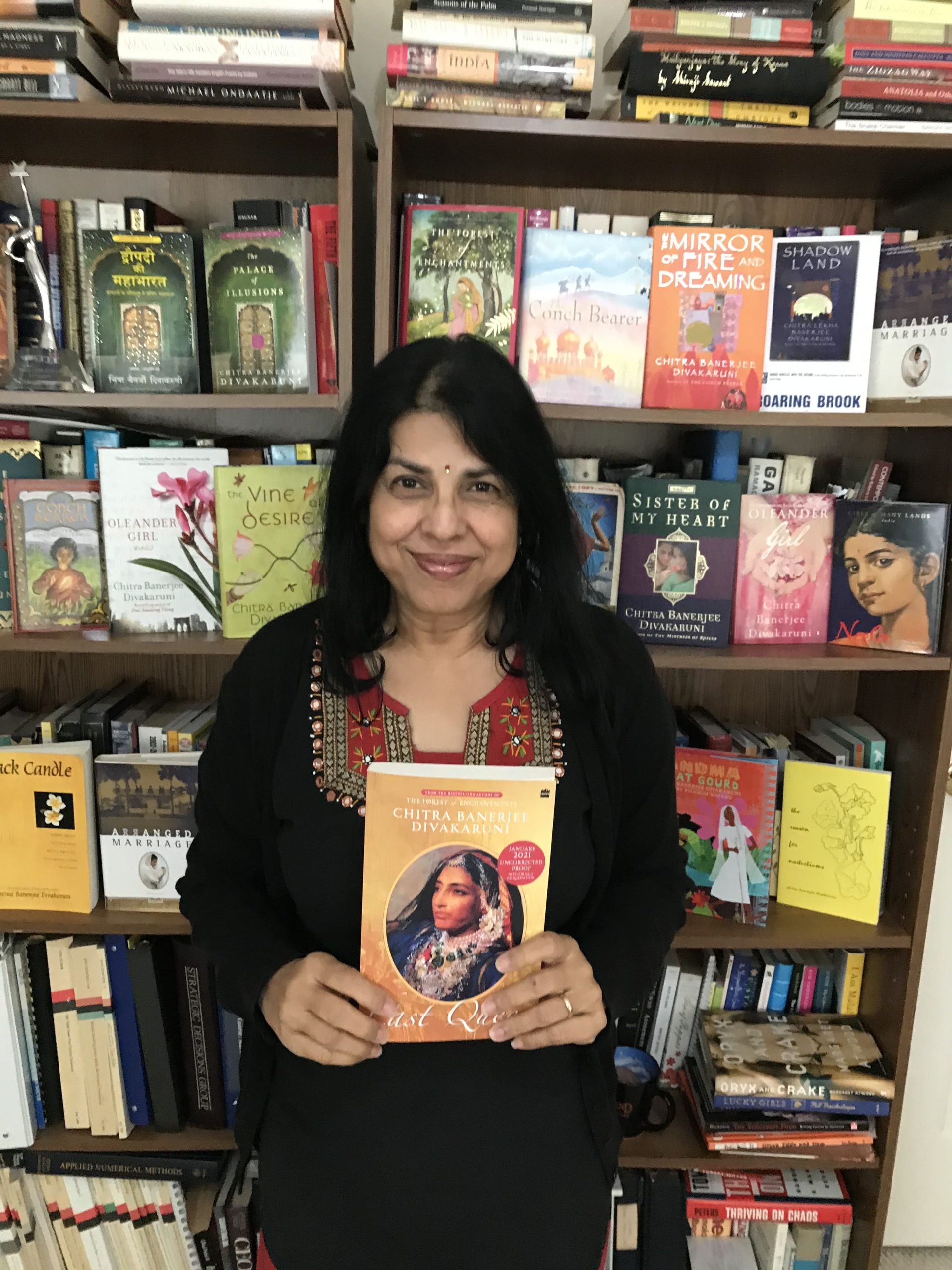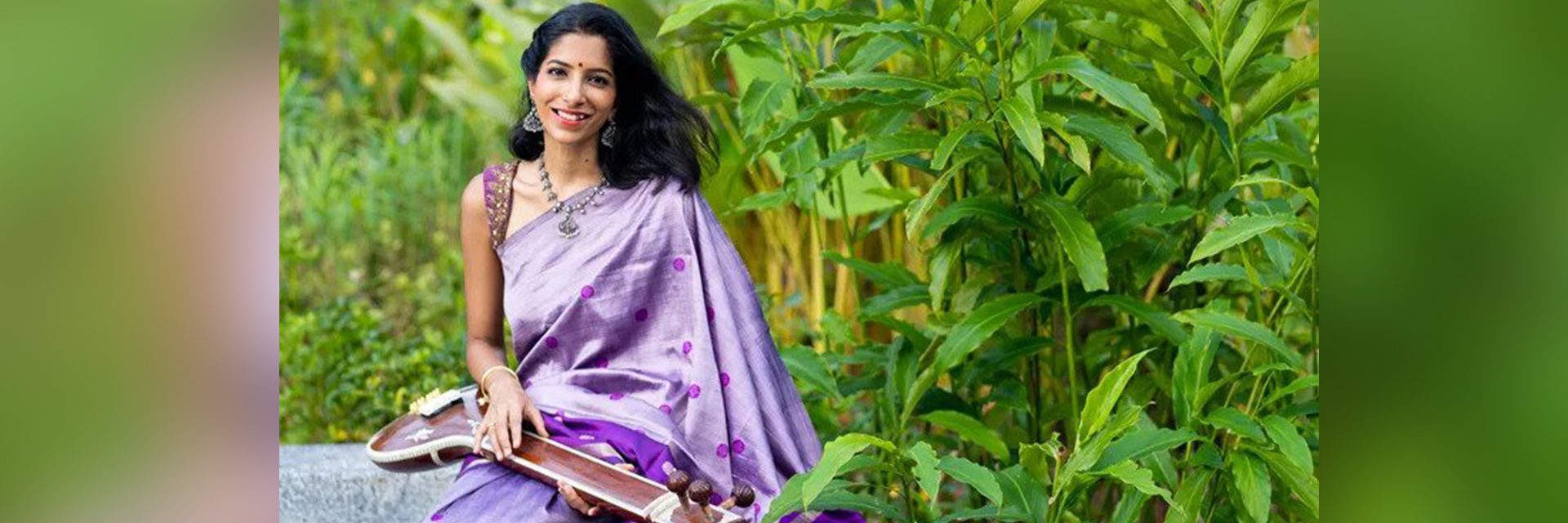(April 30, 2022) Indian epics are among the most revered works of literature over centuries. Several authors have narrated different tales of male protagonists – Rama, Lakshman, Arjun, Krishna, Yudhisthir, and even Ravana and Duryodhana. However, even though women feature in every retelling, seldom are the stories about these legendary women as protagonists explored.

Chitra Banerjee Divakaruni
Houston-based Chitra Banerjee Divakaruni felt this lacuna as she ensconced on her literary journey, as a voracious young reader. Soon, narrating tales of these heroines became her raison d’etre. Today, Chitra is the most noted of Indian-origin storytellers who has turned epics into personal journeys from a women’s perspective. Her novels, Sister of My Heart, Palace of Illusions,The Forest of Enchantments and The Last Queen, etc, all explore a women’s struggle to retain autonomy in a world that privileges men. “I have grown up listening to stories of these women, but from the point of view of a man. So often, I have heard people calling them the reason of great wars, or admiring them for the wrong reasons. I felt that many of these heroines, such as Sita and Draupadi were misunderstood. That prompted me to write about them,” shares the 65-year-old award-winning author, during an interview with Global Indian.
The writer, who struggled financially during her initial days in the US, is a bestselling author today, winning several awards – American Book Award (1996), Crawford Award (1998), and Cultural Jewel Award (2009) and Light of India Award (2011). Currently, Chitra teaches in the nationally-ranked creative writing programme at the University of Houston, where she is the Betty and Gene McDavid Professor of creative writing.
A child of books
Born in Kolkata, as a child Chitra got to travel a lot as her father worked as an accountant at an oil firm. Growing up with three brothers – one elder and two younger – Chitra would spend hours reading. “I was a shy child. Since we travelled a lot, I didn’t have many friends growing up. So, whenever I would get the time, I would read books and befriend its characters,” laughs the author, who feels that since she had no sister, her books capture the strong bond between two female characters. “Fortunately, now I have some great friends,” she shares.
View this post on Instagram
Friends or not, one person she looked forward to meeting every year during the summer vacation was her nanaji (grandfather). “He was a great story-teller. He would narrate stories from Hindu mythology, the two epics – Ramayana and Mahabharata – and even fairy tales. I would be mesmerised,” shares the author. While she loved these stories as a child, as a teenager, Chitra started questioning about the female characters. “I wondered why they were only treated as side characters, even though their actions affected the storyline,” mulled the author, who studied BA from the University of Calcutta in 1976, and decided to move to the US for further studies.
Rising above the storm
Just like her characters, Chitra’s journey wasn’t easy. Soon after she landed in Chicago (1976), her family was engulfed in a financial crisis, that affected her education. The author worked part-time for a year, before enrolling in a master’s at the Wright State University. Her work visa helped her stay afloat. “Those were testing times, not just for me but for my entire family. My parents were not in a condition to help me with the fees, so I worked odd jobs – babysitter, store clerk, bread slicer and even a lab assistant. My elder brother was doing his residency at a US hospital, thus wasn’t in a position to help much,” shares the novelist.
After a year, Chitra saved enough to pay the fees, but continued working. “As a child, my mother always told me that a woman should be financially independent. I understood that statement completely after landing in the US,” says the author, who pursued a PhD in English from the University of California, Berkeley after her master’s.
View this post on Instagram
Things were looking better, but a tragedy – her nanaji’s passing shook her foundation. It was a turning point for her. “I couldn’t even fly back for his funeral as I had no money,” shares Chitra, adding, “I felt homesick. His demise left me grief-stricken. So, I started writing poems for him – some are a part of my first few books,” she adds.
A feminist at heart
During college, Chitra discovered how many south Asian women residing in the US dealt with domestic abuse. Not one to keep quiet, she and a few friends, founded a helpline, Maitri, in 1991. “It’s not like I was oblivious to the fact that women suffered domestic violence. However, what caught my attention was that though other immigrants and African-American women came forward to raise their voice against abuse, south Asian ladies would suffer in silence. I wanted to create a space where they can ask for help without fear, and thus Maitri was born,” shares the author.
View this post on Instagram
Today, Chitra is on the foundation’s advisory board, and that of another Houston NGO – Daya. She was on the board of NGO Pratham Houston working to bring literacy to disadvantaged Indian children, and is presently on its emeritus board.
A family woman
The Texas resident, and her husband Murthy have ridden the storm. Incidentally, she met her husband during his master’s. “He has been the most wonderful husband,” shares Chitra, adding, “After we were blessed with two sons – Anand and Abhay – we decided to keep a nanny, which meant spending a lot of money. So, we both worked tirelessly without any leaves or vacations. I would go to the university in the morning, and hurry home to work on my book. However, Murthy was supportive throughout, not just with the kids, but house chores too. My mother-in-law, Sita Shastri Divakaruni, was also encouraging.”
View this post on Instagram
A proud mother, Chitra used her sons’ names in her children’s novels. “I remember how they would run to me asking what had I written that day when I returned from school,” laughs Chitra, feeling blessed with a beautiful family. “All my books are dedicated to the three men in my life – Murthy, Abhay and Anand,” says the author, who is still a voracious reader, time permitting.




